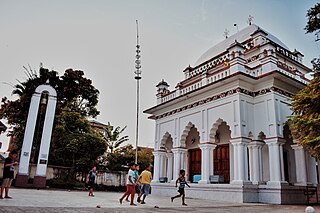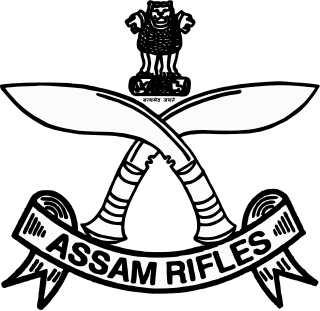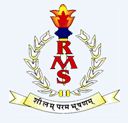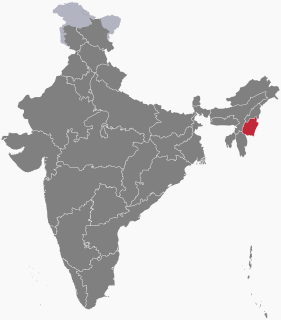Military career
After graduating from the National Defence Academy in 1988, Pillay was commissioned into the 4th battalion of the Brigade of the Guards (4 Guards). He saw active service in the Indian states of Punjab and Jammu and Kashmir before moving to the 8th battalion of the Brigade of the Guards (8 Guards) deployed in India's northeast, where he was involved in an encounter in which he nearly lost his life with multiple gunshots directed on his chest and arm and a grenade blast that exploded on his right foot and blew up a portion of the leg. [7]
In a fateful patrol Pillay led in 1994, he was tasked to protect a few tribal villages during a phase of disturbance that involved ethnic clashes between Nagas and Kukis in Manipur's Tamenglong district. He managed to track down insurgents from the National Socialist Council of Nagaland (NSCN) hiding in Tamenglong and successfully ambushed them in Longdi Pabram village. However, after the surrender of the militants, Pillay, who was near fatally wounded, realised that there were two young children who were injured in the cross fire. When the helicopter arrived to evacuate him, he refused to be moved and insisted that the young children be taken to safety first. [8]
This noble act won over not only the villagers but also the insurgents in the area. Though the villagers presumed that Pillay had died in the encounter, a patrol team sent to the village in March 2010 connected the villagers to Pillay who was immediately invited and felicitated in a major way by the village. The soldier's humanitarian service has also earned him a moniker of "Pillay Pamei" among the local population. "Pamei" is a surname and clan of the influential Zeliangrong community residing in the village. [9] Pillay has thereafter returned several times to the village and has organised several activities for development of the region, earning him the sobriquet of "Hero of Manipur" and "Savior of Longdi Pabram". [10]

Manipur is a state in Northeast India, with the city of Imphal as its capital. It is bounded by the Indian states of Nagaland to the north, Mizoram to the south and Assam to the west. It also borders two regions of Myanmar, Sagaing Region to the east and Chin State to the south. The state covers an area of 22,327 square kilometres (8,621 sq mi) and has a population of almost 3 million, including the Meiteis, Nagas, Kukis, Zomis and other smaller communities, who speak a variety of Sino-Tibetan languages. Manipur has been at the crossroads of Asian economic and cultural exchange for more than 2,500 years. It connects the Indian subcontinent and Central Asia to Southeast Asia, East Asia, Siberia, regions in the Arctic, Micronesia and Polynesia enabling migration of people, cultures and religions.

The Assam Rifles is the oldest branch of the Indian Army, dating back to 1835 under the British Raj, raised under the name Cachar Levy. The present name of "Assam Rifles" has been used since 1917. Similar to the Rashtriya Rifles in Jammu and Kashmir, in the Northeastern States the Assam Rifles is the specialised force that carries out anti-insurgency operations in difficult terrain of the region. Over the course of its history, the Assam Rifles have served in a number of roles, conflicts and theatres including World War I, where they served in Europe and the Middle East, and World War II, where they served mainly in Burma. After the Chinese annexation of Tibet, the Assam Rifles were tasked with manning the Tibetan border of Assam Himalayan region. They were also instrumental in maintaining law and order in Arunachal Pradesh.
"'Armed Forces Act"' (AFSPA), 1958 is an act of the Parliament of India that grants special powers to the Indian Armed Forces to maintain public order in "disturbed areas". According to the Disturbed Areas Act, 1976 once declared 'disturbed', the area has to maintain status quo for a minimum of 6 months. One such act passed on 11 September 1958 was applicable to the Naga Hills, then part of Assam. In the following decades it spread, one by one, to the other Seven Sister States in India's northeast. Another one passed in 1983 and applicable to Punjab and Chandigarh was withdrawn in 1997, roughly 14 years after it came to force. An act passed in 1990 was applied to Jammu and Kashmir and has been in force since.
Lieutenant General Srinivas Kumar Sinha, PVSM, ADC was an Indian Army General who served as the Vice Chief of Army Staff. After his retirement, he served as Governor of the states of Jammu and Kashmir, and Assam.
Lt Gen (Retd.) Madan Mohan Lakhera, PVSM, AVSM, VSM is the former Governor of the Indian state of Mizoram. He held that position from July 2006 till September 2011. During 2004–2006, he was the Lieutenant Governor of the Union Territory of Puducherry, then known as Pondicherry. He has also served as the Lieutenant Governor of the Union Territory of Andaman and Nicobar Islands, while holding additional charge.
The Indian Defence services have established numerous academies and staff colleges across India for the purpose of training professional soldiers in military sciences, warfare command and strategy, and associated technologies.

Para , also known as Para SF, are a group of special forces battalions of the Parachute Regiment in the Indian Army. These units specialize in various roles including hostage rescue, counter-terrorism, unconventional warfare, special reconnaissance, foreign internal defence, counter-proliferation, counter-insurgency, seek and destroy and personnel recovery.

Gaidinliu Pamei popularly known as Rani Gaidinliu was a Naga spiritual and political leader who led a revolt against British rule in India. At the age of 13, she joined the Heraka religious movement of her cousin Haipou Jadonang. The movement later turned into a political movement seeking to drive out the British from Manipur and the surrounding Naga areas. Within the Heraka faith, she came to be considered an incarnation of the Goddess Cherachamdinliu. Gaidinliu was arrested in 1932 at the age of 16, and was sentenced to life imprisonment by the British rulers. Jawaharlal Nehru met her at Shillong Jail in 1937, and promised to pursue her release. Nehru gave her the title of "Rani" ("Queen"), and she gained local popularity as Rani Gaidinliu.

General Kotikalapudi Venkata Krishna Rao, PVSM, was a former chief of the Indian Army and a former governor of Jammu and Kashmir, Nagaland, Manipur and Tripura.

The National Socialist Council of Nagaland (NSCN) is a Naga nationalist separatist group operating mainly in Northeast India, with minor activities in northwest Myanmar (Burma) until 2012. The main aim of the organisation is to establish a sovereign Naga state, "Nagalim", which would consist of all the areas inhabited by the Naga people in Northeast India and northwest Myanmar. The NSCN's slogan is "Nagaland for Christ".

Major Sandeep Unnikrishnan, AC was an Indian Army officer, who was serving in the elite 51 Special Action Group of the National Security Guards on deputation. He was killed in action during the November 2008 Mumbai attacks. He was consequently awarded the Ashoka Chakra, India's highest peacetime gallantry award, on 26 January 2009 by the president Pratibha Patil.
Secession in India typically refers to state secession, which is the withdrawal of one or more states from the Republic of India. Whereas, some have wanted a separate state, union territory or an autonomous administrative division within India. Many separatist movements exist with thousands of members, however, some have low local support and high voter participation in democratic elections.
Longdi pabram is a village in Tamenglong district of Manipur state of India. It has a long history of being affected by insurgency. The village has been in national news in recent years for the efforts of an Indian Army officer, DPK Pillay, who has brought development and relief works at the doorsteps of the village.

Rashtriya Military School Bangalore is a military boarding school in Bangalore, Karnataka, India. It was established on 1 August 1946 and is one of the only five RMS of its kind in India; the other four being Chail Military School established in 1922, Ajmer Military School in 1930, Belgaum Military School in 1945, and Dholpur Military School in 1962. The cadets enrolled in these schools are known as Georgians, after their founder father King George V.

General Dalbir Singh Suhag, PVSM, UYSM, AVSM, VSM, ADC is the current Indian High Commissioner to Seychelles and a former Chief of Army Staff of the Indian Army. He was the 25th Chief of the Army Staff (COAS) of the Indian Army, serving from 31 July 2014 to 31 December 2016, and Vice Chief of the Army Staff prior to that.

Lieutenant General Channira Bansi Ponnappa, AVSM, VSM is a serving General Officer in the Indian Army. Currently, he is Adjutant General of the Indian Army. He has earlier served as the commander of the XI Corps. He also serves as the Colonel of the Mahar Regiment. As a UN peacekeeper, he is known for his role as commander of the United Nations' MONUSCO forces in the North Kivu region of the Democratic Republic of the Congo during the M23 rebellion.

The Insurgency in Manipur is an ongoing armed conflict between India and a number of separatist rebel groups, taking place in the state of Manipur. The Insurgency in Manipur is part of the wider Insurgency in Northeast India; it combines elements of a national liberation war as well as an ethnic conflict.

Lieutenant General Om Prakash, PVSM, UYSM, AVSM, SM is a retired General of the Indian Army. He was the commander of the XV Corps in 2012.

Indian Army operations in Jammu and Kashmir include security operations such as Operation Rakshak, which began in 1990, Operation Sarp Vinash in 2003 and Operation Randori Behak in 2020. Other operations include humanitarian missions such as Operation Megh Rahat and operations with a social aim such as Operation Goodwill and Operation Calm Down. The Indian Army works in tandem with the other arms of the Indian Armed Forces and security forces in Jammu and Kashmir such as during Mission Sahayata or joint operations.
Colonel Viplav Tripathi was an Indian Army officer, martyred in an ambush by Manipuri militants. In that ambush, Triptathi's wife Anuja Shukla and son Abeer were also killed.











